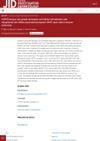 January 2016 in “Journal of SAFOG”
January 2016 in “Journal of SAFOG” Girls with PCOS and menstrual disorders have notably higher androgen hormone levels.
[object Object]  May 2024 in “International Journal For Multidisciplinary Research”
May 2024 in “International Journal For Multidisciplinary Research” The herbal hair cream helps protect and improve hair health.
 68 citations,
January 2015 in “Indian Journal of Dermatology”
68 citations,
January 2015 in “Indian Journal of Dermatology” Microneedling can effectively promote new hair growth in men with hair loss who didn't improve with traditional treatments.
2 citations,
April 2022 in “Biomedicines” Low-frequency electromagnetic fields may help hair growth by affecting certain growth-related molecules.
2 citations,
March 2020 in “International journal of dermatology and clinical research” Microneedling helps hair growth, with hair multivitamins showing slightly better results than minoxidil.
 November 2024 in “Journal of Cosmetic Dermatology”
November 2024 in “Journal of Cosmetic Dermatology” Early treatment can reverse hair loss from dermal fillers.
August 2021 in “Journal of Investigative Dermatology” The technique effectively promotes hair growth in young men with androgenetic alopecia.
 18 citations,
October 2017 in “PLOS ONE”
18 citations,
October 2017 in “PLOS ONE” The study concluded that similar pathways regulate hair growth in dogs and mice, and these pathways are disrupted in dogs with Alopecia X, affecting stem cells and hormone metabolism.
 September 2014 in “Hair transplant forum international”
September 2014 in “Hair transplant forum international” Caffeine, niacinamide, and panthenol may improve hair growth, fullness, and healing when applied to the scalp.
 22 citations,
June 2017 in “Advances in Clinical and Experimental Medicine”
22 citations,
June 2017 in “Advances in Clinical and Experimental Medicine” Polycystic ovary syndrome (PCOS) was first described in 1721, officially diagnosed in the 1990s, and is now known to be partly genetic and linked to insulin resistance, with increased risk of cardiovascular disease and carbohydrate metabolism issues.
 May 2023 in “Scientific Reports”
May 2023 in “Scientific Reports” The seed extract of Lepidium sativum L. can potentially treat hair loss, showing effects similar to 5% minoxidil.
January 2019 in “International Journal of Case Reports and Images” Combining microneedling with light therapy increased hair density by 26% in men.

Hair RiseTM microemulsion effectively promotes hair growth and treats hair loss better than standard treatments.
 5 citations,
May 2019 in “Hormone and Metabolic Research”
5 citations,
May 2019 in “Hormone and Metabolic Research” Women with nonclassic 21-hydroxylase deficiency can have successful pregnancies through IVF, with certain factors affecting their chances.

Autophagy helps activate hair stem cells and hair growth by changing their energy use to glycolysis.
[object Object] 102 citations,
July 2020 in “International journal of molecular sciences” Hormones like testosterone and estrogen significantly affect hair growth and structure.
 101 citations,
January 1997 in “Journal of Investigative Dermatology Symposium Proceedings”
101 citations,
January 1997 in “Journal of Investigative Dermatology Symposium Proceedings” Nerves and chemicals in the body can affect hair growth and loss.
 11 citations,
January 2012 in “International Journal of Trichology”
11 citations,
January 2012 in “International Journal of Trichology” Caffeine may help hair growth in hereditary hair loss.
 12 citations,
July 2021 in “Scientific Reports”
12 citations,
July 2021 in “Scientific Reports” Glutamic acid helps increase hair growth in mice.
 December 2018 in “The Journal of medical research”
December 2018 in “The Journal of medical research” The Consciousness Energy Healing Treatment significantly increased human dermal papilla cell growth, suggesting it may help with hair growth and skin disorders.
 7 citations,
January 2012 in “International Journal of Trichology”
7 citations,
January 2012 in “International Journal of Trichology” A man with Woolly Hair Syndrome had very curly, fragile hair, and doctors used a special scalp examination to diagnose him without invasive tests.
 1 citations,
July 2023 in “International Journal of Molecular Sciences”
1 citations,
July 2023 in “International Journal of Molecular Sciences” Treating fat stem cells with low oxygen boosts hair growth cell growth through specific signaling pathways.
 March 2018 in “Klìnìčna farmacìâ”
March 2018 in “Klìnìčna farmacìâ” New natural remedies for hair loss prevention and treatment were developed.
 April 2023 in “Journal of Investigative Dermatology”
April 2023 in “Journal of Investigative Dermatology” Transplanted stem cells from hair follicles significantly boosted hair growth and normalized follicles in certain mice.
 7 citations,
July 2014 in “Reproductive Biomedicine Online”
7 citations,
July 2014 in “Reproductive Biomedicine Online” The length of CAG repeats in the androgen receptor gene is linked to ovarian reserve but does not affect how the ovaries respond to stimulation.
 43 citations,
December 2008 in “Molecular biology of the cell”
43 citations,
December 2008 in “Molecular biology of the cell” Disrupting Smad4 in mouse skin causes early hair follicle stem cell activity that leads to their eventual depletion.
 75 citations,
January 2009 in “International journal of trichology”
75 citations,
January 2009 in “International journal of trichology” Hair grays due to oxidative stress and fewer functioning melanocytes.
 22 citations,
February 2017 in “Clinical and Experimental Dermatology”
22 citations,
February 2017 in “Clinical and Experimental Dermatology” Icariin helps mouse hair grow by boosting a growth factor in skin cells.
 13 citations,
September 2019 in “EBioMedicine”
13 citations,
September 2019 in “EBioMedicine” sPLA2-IIA increases growth in hair follicle stem cells and cancer cells, suggesting it could be targeted for hair growth and cancer treatment.
 1 citations,
July 2013 in “Hair transplant forum international”
1 citations,
July 2013 in “Hair transplant forum international” Advancements in hair follicle culture have led to better understanding and potential treatments for hair loss.

























